
CBD Oil Benefits for Sleep
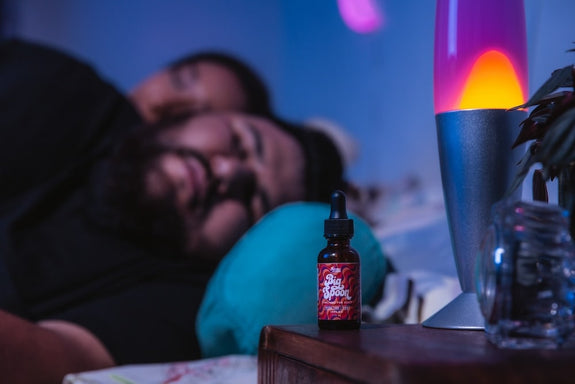
For those wondering whether CBD oil can contribute to better sleep, this article offers a grounded investigation.
We highlight The Top 7 ways CBD Oil Benefits Sleep, The Top 7 Ways CBD Sleep Oil Benefits Your Daily Life and we also address the science and studies behind CBD for sleep, providing you with factual insights and anecdotal evidence.
Read on to explore how taking CBD oil will lead to good sleep hygiene and an increased overall wellbeing.
Key Takeaways
- CBD oil benefits sleep in a multitude of ways, from improvement of sleep quality to a decrease of in daytime sleepiness.
- CBD, or cannabidiol, improves sleep quality by interacting with the endocannabinoid system without the intoxicating effects of THC, with preliminary results showing promise especially with regards to cortisol regulation and positive impact on the sleep-wake cycle.
- CBD oil is considered a natural alternative for enhancing sleep, with users reporting better inducement of sleep, uninterrupted sleep and a non-groggy next day experience.
- While CBD oil shows potential for aiding sleep, proper dosing and timing are crucial, with a recommendation to start with lower doses and increase incrementally.
- A consultation with a healthcare provider is advised due to possible side effects and interactions if you are taking other medications.
The Top 7 Ways CBD Oil Benefits Sleep
CBD (cannabidiol) is believed to help with sleep through several mechanisms, although research is still ongoing to fully understand its benefits.
Here are some key ways CBD may help you improve your sleep:
1. Improvement in Sleep Quality: CBD enhances the overall quality of sleep by increasing the amount of deep sleep, the stage of sleep most important for feeling refreshed and rested. Deep sleep is crucial for physical renewal, hormonal regulation, and growth. By promoting deeper sleep, CBD helps users feel more rested and energetic during the day.
2. Anxiety Reduction: CBD has been reported to have anxiolytic (anxiety-reducing) effects. By reducing anxiety, CBD can help calm the mind, making it easier to fall asleep and stay asleep.
3. Pain Relief: Chronic pain can be a significant disruptor of sleep. CBD may help alleviate body aches, which could in turn improve sleep quality. It does this by affecting the endocannabinoid system, which plays a role in pain sensation and inflammation.
4. Cortisol Regulation: CBD is being studied for affecting the secretion of cortisol, a stress hormone associated with alertness. By reportedly lowering cortisol levels at night, CBD promotes relaxation and leads to more restful sleep.
5. Impact on Sleep-Wake Cycle: CBD has been reported to interact with receptors in the brain that influence the body’s sleep-wake cycles. CBD might have the potential to help regulate sleep patterns, helping those with sleep disorders like insomnia.
6. Reduction in REM Sleep Behavior Disorder (RBD): For people with RBD (a disorder where individuals act out their dreams), CBD has shown promise in reducing occurrences. This can lead to a more restful sleep without interruptions.
7. Decrease in Daytime Sleepiness: Interestingly, CBD may help balance sleep patterns not only by aiding nighttime sleep but also by reducing daytime sleepiness since it does not cause next-day drowsiness. This will help normalize the sleep cycle over time.
It's important to note that while many people report positive effects of CBD on sleep, individual results can vary, and more comprehensive clinical studies are needed to better understand how CBD works and its effectiveness as a sleep aid.
The Top 7 Ways CBD Sleep Oil Benefits Your Daily Life
Here are seven ways CBD sleep oil could benefit your daily life, focusing on improving your well-being.
1. Enhanced Focus and Concentration: By improving sleep quality and duration, CBD oil can help enhance daytime focus and concentration. A good night's sleep is crucial for cognitive functions, including memory, attention, and decision-making.
2. Mood Stabilization: Improved sleep can lead to better mood regulation. CBD oil's potential to enhance sleep can indirectly help stabilize mood swings and maintain emotional balance throughout the day.
3. Increased Energy Levels: Better sleep quality often results in higher energy levels during the day. By potentially improving sleep, CBD oil can help individuals feel more energetic and less fatigued.
4. Boosted Immune System: Sleep is a critical factor in the proper functioning of the immune system. By promoting better sleep, CBD oil may indirectly support immune health, potentially reducing vulnerability to illnesses or infections.
5. Enhanced Metabolic Health: Sleep impacts various metabolic processes, including those related to weight, insulin sensitivity, and hormone levels. Improved sleep via CBD oil could contribute to better overall metabolic health.
6. Reduced Dependence on Sleep Medications: For those who rely on sleep medicine, CBD oil provides a more natural alternative, potentially reducing the need for pharmacological solutions and their associated side effects.
7. Improved Long-Term Health: Chronic sleep deprivation is linked to several long-term health issues, including cardiovascular disease and diabetes. By improving sleep quality, CBD oil may contribute to better long-term health conditions.
The Science Behind CBD and Sleep
Have you ever wondered how CBD might interact with your sleep?
CBD, or cannabidiol, is a substance from cannabis that communicates with the endocannabinoid system in our bodies.
Unlike THC, another cannabinoid, CBD doesn’t bind directly to CB1 or CB2 receptors, thus avoiding the intoxicating effects typically associated with cannabis.
CBD interacts with the body's endocannabinoid system (ECS) in this way, playing a key role in regulating a broad range of physiological processes, including sleep, mood, appetite, and pain sensation.
Specifically for sleep, CBD is thought to exert its effects by influencing the receptors in the brain that govern the body’s daily sleep/wake cycles. Also, CBD’s calming properties on the nervous system and interaction with the serotonin system could potentially affect mood and sleep quality.
Overall, while the precise mechanisms remain under study, the interaction between CBD and the ECS suggests a promising influence on sleep quality and consistency and comes with a multitude of health benefits.
The incorporation of clinical data from randomized clinical trials in future research will further strengthen these findings.
Comparing CBD Oil to Other Sleep Aids
CBD for sleep is a better option for receiving a good night's rest compared to other supplements and sleep medicine, see how below:
1. Natural and Non-Habit Forming: Unlike many pharmaceutical sleep aids, CBD oil is derived from the cannabis plant and is considered non-habit forming. This makes it an appealing option for those seeking natural alternatives without the risk of dependency or withdrawal symptoms.
2. Fewer Side Effects: Traditional sleep medications can often come with a range of side effects, including daytime drowsiness, dizziness, and even potential for overdose. CBD oil is generally well-tolerated, with milder side effects such as fatigue or changes in appetite, offering a gentler alternative.
3. Holistic Benefits: CBD oil not only aids in sleep but also may offer holistic benefits such as stress reduction, pain relief, and anti-inflammatory properties. Although, more research needs to be conducted on the cannabinoid. This multifaceted approach can enhance overall well-being, beyond just improving sleep.
4. Does Not Cause Grogginess: Many sleep aids can leave individuals feeling groggy or mentally slow the next day. CBD oil typically does not result in such a hangover effect, allowing users to wake up feeling more refreshed and alert.
CBD for sleep might be particularly helpful for people with mental health conditions in improving sleep quality and reducing anxiety, although it is advised to consult doctors or sleep coaches if you are suffering from these conditions and looking to establish a CBD regimen.
CBD for Sleep: The Melatonin Replacement
CBD is becoming increasingly popular as an alternative to melatonin for those seeking a more natural and holistic approach to improving sleep quality.
While melatonin directly influences the sleep-wake cycle by signaling to the body that it is time to sleep, CBD offers a broader range of benefits that address the root causes of sleep disturbances.
One significant advantage of CBD over melatonin is its ability to alleviate factors that often disrupt sleep, such as anxiety and pain. Unlike melatonin, which primarily works by adjusting the body's internal clock, CBD interacts with the body's endocannabinoid system to promote a sense of overall calm and relaxation.
Moreover, CBD does not just promote quicker sleep onset like melatonin; it also aids in achieving deeper and more restful sleep cycles. For many, this results in waking up feeling more refreshed and alert.
Additionally, CBD's non-habit-forming nature is a crucial benefit, providing a sleep aid solution that users can rely on without the risk of dependency or the need for progressively larger doses, which can be a concern with melatonin and other sleep medications.
Finally, CBD is known for having fewer and less severe side effects compared to melatonin, which can cause headaches, dizziness, nausea, and daytime drowsiness.
CBD's side effects, when they occur, are typically mild and might include fatigue or changes in appetite. This safety profile, combined with its holistic benefits, makes CBD for sleep an attractive option for those looking to improve not just their sleep but their overall well-being.
Choosing the Right CBD Oil for Sleep
Selecting the appropriate CBD oil for sleep is a significant decision. Common CBD products designed for sleep include:
- CBD Oil Tinctures
- CBD Gummies
- CBD Capsules
- CBD Topicals, like skin cream
- CBD Tea
When consuming CBD edibles, it’s recommended to start with low doses and monitor the body’s response, while also consulting a healthcare provider if other medications are in use.
However, the purity and dosage of CBD can vary across hemp derived CBD products, which could lead to consuming more levels of CBD or THC than intended.
How to Use CBD Oil for Optimal Sleep Benefits
Understanding the proper use of CBD oil for poor sleep can make a substantial difference. Determining the correct dosage is crucial to this process.
In order to establish a complementary and integrative health program, it's important to consume CBD in the right way.
Determining Your Ideal Dosage
Determining the correct dosage is essential to tap into CBD’s potential benefits for sleep. To calculate CBD oil dosage, determine the severity of your condition and adjust based on personal response.
Check out this article titled How Much CBD Oil to Take for Sleep which includes a chart highlighting the starting point of 5-10mg for mild sleep issues and 50mg+ for those with heightened trouble sleeping.
The ideal dosage can also vary based on factors like age, sex, metabolic rate, and product quality, with higher doses potentially needed for serious insomnia cases.
It’s worth noting that using a dropper for CBD oils allows for precise dosing, although actual CBD content may vary from the product label.
Before starting CBD, it’s crucial to conduct research on credible brands, and ultimately pick a company like Sunday Scaries where we showcase our lab results to ensure accurate dosing for each batch.
Also, keep in mind that taking CBD with high-fat foods can increase absorption fourfold, potentially influencing dosage adjustments.
Timing and Method of Consumption
What is the ideal timing and method to consume CBD oil for optimal sleep benefits?
Using CBD oil for sleep is recommended 30 to 60 minutes before bedtime, particularly when administered sublingually for quicker absorption.
Sublingual administration of CBD oil offers faster and more predictable absorption by bypassing the first pass effect in the liver.
Check out this article to discover the optimal timing of When to Take CBD Oil for Sleep?
Potential Risks and Side Effects of Using CBD Oil for Sleep
Despite the promising potential benefits of CBD oil for sleep, awareness of possible risks, safety and side effects is a must. CBD oil use can result in side effects such as:
- Dry mouth
- Diarrhea
- Reduced appetite
- Drowsiness
- Fatigue
- Sedation
- Sleep disturbances
Additionally, CBD can slow down the liver’s ability to break down certain medications, potentially leading to interactions with other drugs.
Moreover, due to the lack of FDA regulation on CBD dosing, there’s a risk of liver abnormalities and inadvertent exposure to THC, which varies among CBD products.
Drug Interactions
One possible risk with CBD oil consumption is its potential to interact with other medications. CBD can influence the metabolism of other medications in the body, including blood thinners. This interaction could result in those drugs being less effective or cause an increase in their side effects.
Due to this potential for drug interactions, it’s crucial to consult a healthcare professional before using CBD oil concurrently with other medications for sleep.
Real-Life Experiences: Testimonials on the Benefits of CBD Oil for Sleep
What is the practical experience with CBD oil?
Users report feeling more focused and relaxed the following morning compared to traditional sleep aids, which can sometimes cause side effects like dizziness and daytime drowsiness.
Furthermore, over 83% of Sunday Scaries survey respondents using cannabis for sleep reported that it helps by relaxing their mind and body (reducing brain chatter), which enables them to fall asleep more faster.
A 5 star rating from a Big Spoon, CBN + CBD Sleep Oil, customer:
"I work night shift and have a hard time falling asleep after work sometimes. This is my first ever CBD product. I love this stuff, I take a half dropper and it slowly lulls me to sleep in about 30 minutes. I have no grogginess, weird nightmares, no side effects. Honestly this has saved my life so many times when I'm having anxiety or trouble getting to sleep. 10/10!!! 🙂🙂"
- Alexis De Los S. (Verified Buyer)
Summary
In wrapping up, CBD oil offers a promising natural alternative for improving sleep quality with a wide array of benefits. While further research is needed to confirm its efficacy, early studies and testimonials suggest it could play a beneficial role in helping users fall asleep, stay asleep and wake up non-groggy.
CBD’s interaction with the endocannabinoid system, its potential calming properties, and absence of intoxicating effects make it an appealing option for those seeking a good night’s sleep.
As always remember to consult a healthcare provider before starting any new treatment regimen, including CBD oil.
Frequently Asked Questions
Can CBD oil help improve sleep quality?
Yes, early studies and testimonials suggest that CBD oil could play a beneficial role in managing sleep disorders and improving sleep quality.
How does CBD oil compare to other sleep aids?
CBD oil has shown potential in affecting neurochemical processes related to sleep and is different from THC, as it doesn't have psychoactive effects. It is a natural compound that influences mood, stress levels, and sleep-wake cycles.
What is the recommended CBD oil dosage for sleep?
Start with a dose of 1-6 mg per every 10 lbs of body weight, beginning at 25 milligrams, and adjust as needed based on your response. Adjustments may be based on personal tolerance and sleep improvement. For more information, check out our resource: What Strength CBD Oil for Sleep?
What are the potential risks and side effects of using CBD oil for sleep?
Using CBD oil for sleep may pose potential risks and side effects such as dry mouth, diarrhea, reduced appetite, drowsiness, fatigue, and sleep disturbances, along with potential drug interactions and liver abnormalities. Be cautious when using CBD oil for sleep.
What are some real-life experiences of using CBD oil for sleep?
Users have reported improved sleep quality, focus, and clarity when using CBD oil, leading to an overall sense of well-being.
Can I replace CBD for sleep with THC Gummies for sleep?
Yes, you can replace CBD for sleep with THC Gummies, including delta-9 THC gummies. THC (tetrahydrocannabinol) is known for its psychoactive effects and can help with sleep by inducing relaxation and reducing stress. Delta-9 THC gummies are particularly effective because they contain the active compound that interacts with your endocannabinoid system to promote sleep. However, it's essential to consider that THC gummies for sleep may cause a "high" and potential side effects such as dizziness or altered mental state.

 CBD Gummies
Stress Relief
CBD Gummies
Stress Relief
 Extra Strength CBD Gummies
Stress Relief
Extra Strength CBD Gummies
Stress Relief
 Vegan CBD Gummies
Stress Relief
Vegan CBD Gummies
Stress Relief
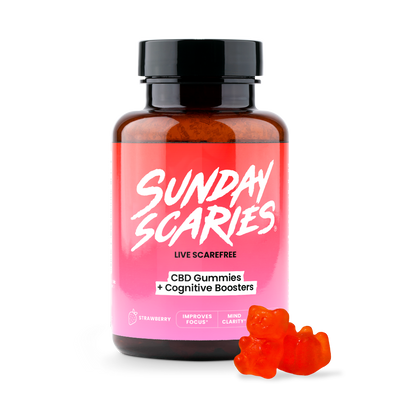 CBD Gummies for Focus
Focus Boost
CBD Gummies for Focus
Focus Boost
 CBD Candy
Mood Lift
CBD Candy
Mood Lift
 CBD Daytime Oil
Stress Relief
CBD Daytime Oil
Stress Relief
 CBD Sleep Oil
Sleep Aid
CBD Sleep Oil
Sleep Aid
 CBD Dog Treats
Stress Relief
CBD Dog Treats
Stress Relief
 Side Piece Bundle
Stress Relief
Side Piece Bundle
Stress Relief
 Rando Bundle
Stress Relief
Rando Bundle
Stress Relief
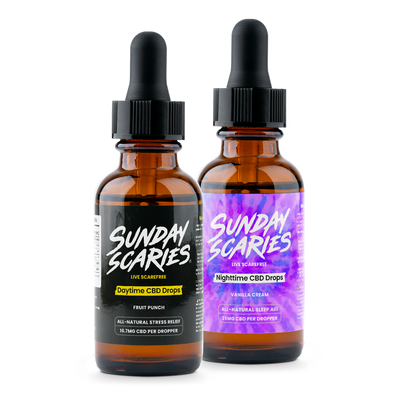 Sunrise & Sunset CBD Oil Bundle
Stress Relief
Sunrise & Sunset CBD Oil Bundle
Stress Relief
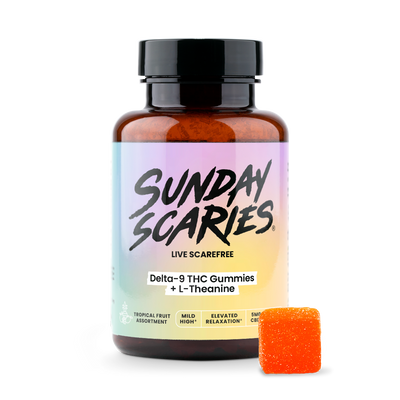 5mg Delta-9 Gummies
Euphoria
5mg Delta-9 Gummies
Euphoria
 10mg Delta-9 Gummies
Euphoria
10mg Delta-9 Gummies
Euphoria
 THC Gummies for Sleep
Sleep Aid
THC Gummies for Sleep
Sleep Aid
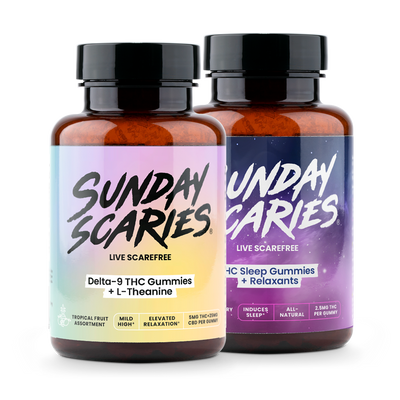 Day & Night THC Gummies Bundle
Stress Relief
Day & Night THC Gummies Bundle
Stress Relief
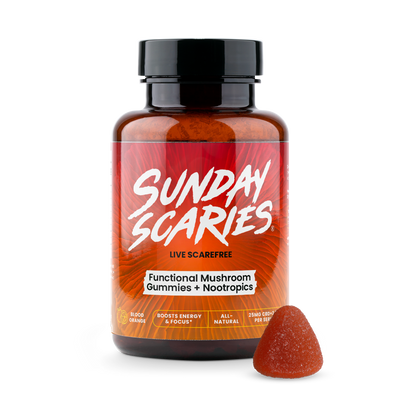 Mushroom Gummies
Focus Boost
Mushroom Gummies
Focus Boost
 Shilajit Gummies
Focus Boost
Shilajit Gummies
Focus Boost
 Sunday Scaries Hat
Sunday Scaries Hat
 Sunday Scaries Dad Hat
Sunday Scaries Dad Hat
 Sunday Scaries T-Shirt
Sunday Scaries T-Shirt
 Sunday Scaries Pocket Tee
Sunday Scaries Pocket Tee
 Sunday Scaries Tank Top
Sunday Scaries Tank Top
 Sunday Scaries Sweatshirt
Sunday Scaries Sweatshirt
 Sunday Scaries Blanket Jacket
Sunday Scaries Blanket Jacket
 Sunday Scaries Sweatpants
Sunday Scaries Sweatpants

